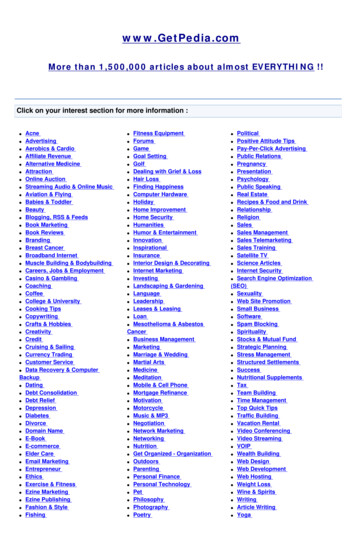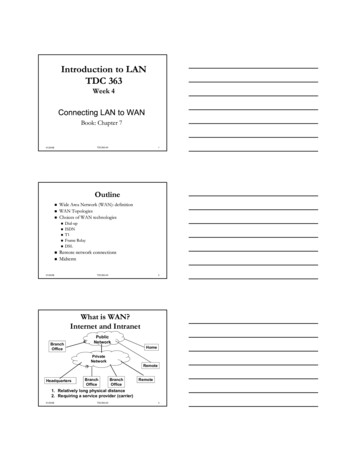
Transcription
www.GetPedia.comMore than 1,500,000 articles about almost EVERYTHING !!Click on your interest section for more information :Acne Advertising Aerobics & Cardio Affiliate Revenue Alternative Medicine Attraction Online Auction Streaming Audio & Online Music Aviation & Flying Babies & Toddler Beauty Blogging, RSS & Feeds Book Marketing Book Reviews Branding Breast Cancer Broadband Internet Muscle Building & Bodybuilding Careers, Jobs & Employment Casino & Gambling Coaching Coffee College & University Cooking Tips Copywriting Crafts & Hobbies Creativity Credit Cruising & Sailing Currency Trading Customer Service Data Recovery & ComputerBackup Dating Debt Consolidation Debt Relief Depression Diabetes Divorce Domain Name E-Book E-commerce Elder Care Email Marketing Entrepreneur Ethics Exercise & Fitness Ezine Marketing Ezine Publishing Fashion & Style Fishing Fitness Equipment Forums Game Goal Setting Golf Dealing with Grief & Loss Hair Loss Finding Happiness Computer Hardware Holiday Home Improvement Home Security Humanities Humor & Entertainment Innovation Inspirational Insurance Interior Design & Decorating Internet Marketing Investing Landscaping & Gardening Language Leadership Leases & Leasing Loan Mesothelioma & AsbestosCancer Business Management Marketing Marriage & Wedding Martial Arts Medicine Meditation Mobile & Cell Phone Mortgage Refinance Motivation Motorcycle Music & MP3 Negotiation Network Marketing Networking Nutrition Get Organized - Organization Outdoors Parenting Personal Finance Personal Technology Pet Philosophy Photography Poetry Political Positive Attitude Tips Pay-Per-Click Advertising Public Relations Pregnancy Presentation Psychology Public Speaking Real Estate Recipes & Food and Drink Relationship Religion Sales Sales Management Sales Telemarketing Sales Training Satellite TV Science Articles Internet Security Search Engine Optimization(SEO) Sexuality Web Site Promotion Small Business Software Spam Blocking Spirituality Stocks & Mutual Fund Strategic Planning Stress Management Structured Settlements Success Nutritional Supplements Tax Team Building Time Management Top Quick Tips Traffic Building Vacation Rental Video Conferencing Video Streaming VOIP Wealth Building Web Design Web Development Web Hosting Weight Loss Wine & Spirits Writing Article Writing Yoga
How to DevelopA SUPER-POWERMEMORYby Harry LorayneA. THOMAS & CO.PRESTON
ContentsForewordHow Keen Is Your Observation?1113Habit Is Memory20Test Your Memory24Does what you see register in your mind? Whichlight is on top of the traffic light? Is the number sixon your watch dial, the Arabic #6 or is it theRoman #VI? Other observation questions. Theimportance of observation in memory.There is no such thing as a poor memory, only atrained or untrained one. There is no limit to thecapacity of the memory. Lucius Scipio was able toremember the names of all the people of Rome;Seneca could memorize and repeat two thousandwords after hearing them once.If you can remember any one thing by association,you can do it with anything else. A series of testsfor you to take now to indicate how limited youruntrained memory is.Interest in Memory32Link Method of Memory39The first step is to be interested in rememberingnames, faces, dates, figures, facts—anything, andthat you have confidence in your ability to retrainthem.What the Link Method is. Use this method ofassociating ridiculous mental images with itemsyou want to remember. Start to remember asyou've never remembered before.
ContentsPeg System of Memory48The Peg System helps you associate and remembernumbers. You can learn to remember 52 items bynumber, in and out of order.Uses of the Peg and Link Systems60Start with remembering a Shopping List and DailyErrands. From this you will go on to more difficultfeats.How to Train Your ObservationTest yourself (and your friends) on a "trick" sign.How to sharpen and develop your observation abilities.66It Pays to Remember Speeches, Articles, Scriptsand Anecdotes72How to retain the contents of a speech or script JOTdelivery or use when wanted. How to memorizethe complete contents of a magazine!It Pays to Remember Playing Cards81How to remember the lay and play of cards in anycard game. How to perform memory feats withcards.It Pays to Remember Long Digit Numbers91Some Pegs for Emergencies97How to remember numbers—short, long, in sequence and out.How the Alphabet can aid your memory.It Pays to Remember DatesHow to remember any date; how to perform stuntswith days and dates; learn to do the amazing "perpetual calendar" stunt.104
ContentsIt Pays to Remember Foreign Language Vocabulary & Abstract Information114Learn the system of substitute words to help youto remember difficult foreign words, thoughts andabstract ideas.It Pays to Remember Names and Faces120Impress the name on your mind; associate thename and face with something of significance toyourself.What's in a Name?128More advice on how to remember names. Substitute picture words and symbols for names.More about Names and Faces139It Pays to Remember Facts about People151Now test your ability to remember names andfaces. Compare your score and your improvement.The more you can remember about people youmeet, the more success and happiness you willhave in your social and business life.It Pays to Remember Telephone Numbers157The Importance of Memory167Don't Be Absent-minded174Here's how you will be able to remember anynumber of telephone numbers with the greatestof ease.How a trained memory helped successful men andwomen in their activities and careers.How to handle and overcome mental blocks.Amaze Your FriendsLearn the incredible "400 digit" memory feat andastound your friends.181
Contents189A simple way to keep your daily and weekly appointments and schedules on your mind.It Pays to Remember Appointments and SchedulesIt Pays to Remember Anniversaries, Birthdays andOther Important Dates199How to apply the methods you have learned to remember important dates in your life.Memory Demonstrations205Use the Systems212Learn how to memorize the Morse Code in justhalf an hour.Now, with full confidence, you can rememberprices, style numbers, state capitals, calories, factsand ideas—anything you want to remember.
Forewordmark twain is reported to have said that "everyone talksabout the weather, but no one does anything about it."Similarly, everyone talks or brags about their bad memory,but few people ever do anything about it. Let's face it, thereisn't much you can do about the weather, but there's agreat deal that you can do about your bad memory.Many people have told me that they would "give a million dollars" if they could acquire a memory like mine.Well, don't misunderstand me, I wouldn't turn down youroffer of a million dollars; but, actually the price of this bookis all you need to spend.This isn't true in its strictest sense; you'll also have tospend just a little bit of your time, and just a little effortto get the brain working. Once you've started on my system, you may be surprised as to how simple and obvious itreally is.If you purchased this book expecting a theoretical harangue of technical terms, you are doomed to disappointment. I have tried to write and explain the system as if Iwere sitting in your living room and explaining it to youthere.Although naturally, quite a bit of research was necessary,I've discarded most of the technical ideas and thoughts be-
Forewordcause I found them difficult to understand and to applymyself. I am an entertainer and a memory expert, not apsychiatrist or a doctor, and I didn't think it necessary togo into an explanation of the workings of the human brain,and just how the memory actually works in terms of cells,curves, impressions, etc.So you will find that all the ways and methods in thebook are those that I use myself and therefore feel qualified to teach to you.Psychologists and educators have said that we use only asmall percentage of our brain power—I think the systemhere will enable you to use just a little more than average.So, if like your operations, you have been bragging aboutyour poor memory; I think that after you've read this book,you'll still brag about your memory, but to the other extreme. Now, you'll be able to boast of possessing a wonderfully retentive and accurate memory!
How Keen Is Your ObservationWhich light is on top of the traffic light? Is it the Red or theGreen? Your first thought, probably is that this is an easy question to answer. However, put yourself in this position—you areon one of the current quiz shows that pays a lot of money forcorrect answers. You must answer this question correctly to winthe top prize. Now then, which light is on top, the Red or theGreen?if you have been able to picture yourself in the above position, you are probably hesitating now, because you're notreally sure which light is on top, are you? If you are sure,then you're one of the minority who has observed whatmost people only see. There is a world of difference between seeing and observing; proven, of course, by the factthat most of the people to whom I put the above question,either give the wrong answer or are not sure. This, eventhough they see the traffic lights countless times every day!By the way, Red is always on top of the traffic light,Green is always on the bottom. If there is a third color, itis usually Yellow, for caution, and that one is always in thecenter. If you were sure that Red was the correct answer, letme see if I can't puncture your pride a bit with another observation test.13
14How Keen Is Your Observation?Don't look at your wrist watch! Don't look at your wristwatch, and answer this question:—Is the number six onyour watch dial, the Arabic #6, or is it the Roman NumeralVI? Think this over for a moment, before you look at yourwatch. Decide on your answer as if it were really importantthat you answer correctly. You're on that quiz show again,and there's a lot of money at stake.All right, have you decided on your answer? Now, lookat your watch and see if you were right. Were you? Orwere you wrong in either case, because your watch doesn'thave a six at all!? The small dial that ticks off the secondsusually occupies that space on most modern watches.Did you answer this question correctly? Whether youdid or did not, you had to look at your watch to check. Canyou tell now, the exact time on your watch? Probably not,and you just looked at it a second ago! Again, you saw, butyou didn't observe.Try this on your friends. Although people see theirwatches innumerable times every day, few of them can tellyou about the numeral six.Here's another one to try on your friends; but you'd better see if you can answer it first. If you are a cigarettesmoker, you have seen a blue tax stamp on your pack ofcigarettes each time you take it out to remove a cigarette.On this tax stamp is the picture of a man, and his name isprinted under the picture.For the top prize on our imaginary quiz show, name thisman! I guess you'll have to leave the quiz show with onlythe consolation prize. I say this so definitely because onlyabout two or three of the many people I've tested, haveanswered this one correctly. The man pictured on the revenue stamp is De Witt Clinton! Check it.I don't want to be sneaky, but if you've just looked at thestamp and at the picture of De Witt Clinton, you must
How Keen Is Your Observation?15have seen what Clinton was doing with his left hand. Youalso saw, or probably saw, four letters, two on the upperleft and two on the upper right of the stamp. I say that yousaw these things, I don't think you observed them. If youdid, you should be able to tell yourself right now, whatDe Witt Clinton is doing with his left hand, and also namethe four letters.Had to look again, didn't you? Now you've observed thathis left hand is at Clinton's temple, as if he were thinking,and the letters are, U.S.I.R. for United States InternalRevenue.Don't feel too badly if you couldn't answer any of thesequestions; as I said before, most people can't. You mayrecall a motion picture a few years ago which starred Ronald Colman, Celeste Holm and Art Linkletter. The picturewas "Champagne for Caesar," and it was about a man whocouldn't be stumped with any question on a quiz show.The finale of the film was the last question of the quiz,which was worth some millions of dollars. To earn thesemillions, Ronald Colman was asked to give his own socialsecurity number. Of course, he didn't know it! This wasamusing and interesting, to me, anyway, since it struckhome. It proves, doesn't it, that people see but do not observe? Incidentally, do you know your social security number?Although the systems and methods contained in thisbook make you observe automatically, you will find someinteresting observation exercises in a later chapter. The system will also make you use your imagination with morefacility than ever before.I've taken the time and space to talk about observationbecause it is one of the things important to training yourmemory. The other, and more important thing, is association. We cannot possibly remember anything that we do
16How Keen Is Your Observation?not observe. After something is observed, either by sight orhearing, it must, in order to be remembered, be associatedin our minds with, or to, something we already know or remember.Since you will observe automatically when using my system, it is association with which we will mostly concernourselves.Association, as pertaining to memory, simply means theconnecting or tying up of two (or more) things to eachother. Anything you manage to remember, or have managed to remember, is only due to the fact that you havesubconsciously associated it to something else."Every Good Boy Does Fine." —Does that sentencemean anything to you? If it docs, then you must havestudied music as a youngster. Almost every child thatstudies music is taught to remember the lines of the musicstaff or treble clef, by remembering, "Every Good Boy DocsFine."I've already stressed the importance of association, andI want to prove to you that you have used definite conscious associations many times before, without even realizing it. The letters, E, G, B, D and F don't mean a thing.They are just letters, and difficult to remember. The sentence, "Every Good Boy Does Fine" does have meaning,and is something you know and understand. The newthing, the thing you had to commit to memory was associated with something you already knew.The spaces of the music staff were committed to memory with the same system; the initial system. If you remembered the word, "face," you remembered that thespaces on the staff are, F, A, C, and E. Again you associatedsomething new and meaningless to something you alreadyknew and to something that had meaning to you.It is probably many years since you learned the jinglet,
How Keen Is Your Observation?17"Thirty days hath September, April, June and November,all the rest have thirty-one, etc.," but how many times haveyou relied on it when it was necessary to know the numberof days in a particular month?If you were ever taught to remember the nonsense word,"vibgyor," or the nonsense name, "Roy B. Giv," then youstill remember the colors of the spectrum: Red, Orange,Yellow, Blue, Green, Indigo and Violet. This again is theassociation and initial system.I am sure that many times you have seen or heard something which made you snap your fingers, and say, "Oh, thatreminds me. . . ." You were made to remember somethingby the thing you saw or heard, which usually had no obvious connection to the thing you remembered. However,in your mind, the two things were associated in some way.This was a subconscious association. Right now, I am pointing out a few examples of conscious associations at work;and they certainly do work. People who have forgottenmany things that they learned in their early grades, stillremember the spaces and lines of the treble clef. If yonhave read this chapter so far, concentrating as you read,you should know them by now, even if you've never studiedmusic.One of the best examples I know, is the one which wasa great help to me in my early grade spelling classes. Wewere being taught that the word, "believe" was spelled withthe e following the i. In order to help us to commit this tomemory, we were told to remember a short sentence,"Never believe a lie."This is a perfect instance of a conscious association. Iknow for a fact that many adults still have trouble spelling,"believe." They are never quite sure if the i is first, or if itis the e. The spelling of the word, "believe" was the newthing to remember. The word, "lie" is a word we all already
18How Keen Is Your Observation?knew how to spell. None of the students that heard thatlittle sentence, ever again misspelled the word, "believe."Do you have trouble spelling the word, "piece"? If you do,just remember the phrase, "piece of pie." This phrase willalways tell you how to spell, "piece."Can you draw anything that resembles the map of England, from memory? How about China, Japan or Czechoslovakia? You probably can't draw any of these. If I hadmentioned Italy, ninety percent of you would have immediately seen a picture of a boot in your mind's eye. Is thatright? If you did, and if you draw a boot, you will have theapproximate outline of the map of Italy.Why did this picture appear in your mind's eye? Onlybecause, at one time or another, perhaps many years ago,you either heard or noticed that the map of Italy resembleda boot. The shape of Italy, of course, was the new thing toremember; the boot was the something we already knewand remembered.You can see that simple conscious associations helpedyou memorize abstract information like the above examplesvery easily. The initial system that I mentioned earlier, canbe used to help you memorize many things. For example,if you wanted to remember the names of the Dionne quintuplets, you could try to remember the word, "macey." Thiswould help you to recall that the girls' names are, Marie,Annette, Cecile, Emilie and Yvonne.There's only one thing wrong with this idea in its presentstage. There is nothing to make you remember that theword, "macey" is connected with the Dionne quintuplets,or vice versa.If you remembered the word; fine, then you would probably know the names of the quints; but, how do you remember the word? I'll show you how to do this in futurechapters.
How Keen Is Your Observation?19The systems and methods in this book will show you howthe principles and ideas of simple conscious associationscan be applied to remembering anything. Yes, that's right—remembering anything, including names and faces, items,objects, facts, figures, speeches, etc. In other words, the systems and methods you will learn in this book, can be applied to anything and everything in every day social or business life.
Habit Is MemoryI feel assured that there is no such thing as ultimate forgetting;traces once impressed upon the memory are indestructible.—Thomas De Quinceyan accurate and retentive memory is the basis of all business success. In the last analysis, all our knowledge is basedon our memories. Plato said it this way, "All knowledge isbut rememberance"; while Cicero said of memory, it is "thetreasury and guardian of all things." One strong exampleshould suffice for the time being—you could not be readingthis book right now, if you didn't remember the sounds ofthe twenty-six letters of our alphabet!This may seem a bit far fetched to you, but it is true,nevertheless. Actually, if you were to lose your memorycompletely, you would have to start learning everythingfrom scratch, just like a new born baby. You wouldn't remember how to dress, or shave, or apply your makeup, orhow to drive your car, or whether to use a knife or fork, etc.You see, all the things we attribute to habit, should beattributed to memory. Habit is memory.Mnemonics, which is a large part of a trained memory, isnot a new or strange thing. As a matter of fact, the word,"mnemonic" is derived from the name of the Greek God-20
Habit Is Memory21dess, Mnemosyne; and, memory systems were used as farback as early Greek civilization. The strange thing is thattrained memory systems are not known and used by manymore people. Most of those who have learned the secretof mnemonics in memory, have been amazed, not only attheir own tremendous ability to remember, but also at thekudos they received from their families and friends.Some of them decided it was too good a thing to teach toanyone else. Why not be the only man at the office whocould remember every style number and price; why not bethe only one who could get up at a party, and demonstratesomething that everyone marvelled at?I, on the other hand, feel that trained memories shouldbe brought to the foreground, and to this end—this bookis dedicated. Although some of you may know me as anentertainer, it is not my purpose, of course, to teach you amemory act. I have no desire to put you on the stage. I dowant to teach you the wonderful practical uses of a trainedmemory. There are many memory stunts taught in thisbook; these are fine for showing your friends how brightyou are. More important, they are excellent memory exercises, and the ideas used in all the stunts can be appliedpractically.The question that people ask me most often, is, "Isn't itconfusing to remember too much?" My answer to that is,"No!" There is no limit to the capacity of the memory.Lucius Scipio was able to remember the names of all thepeople of Rome; Cyrus was able to call every soldier in hisarmy by name; while Seneca could memorize and repeattwo thousand words, after hearing them once.I believe that the more you remember, the more you canremember. The memory, in many ways, is like a muscle. Amuscle must be exercised and developed in order to giveproper service and use; so must the memory. The difference
22Habit Is Memoryis that a muscle can be overtrained or become muscleboundwhile the memory cannot. You can be taught to have atrained memory just as you can be taught anything else.As a matter of fact, it is much easier to attain a trainedmemory than, say, to learn to play a musical instrument. Ifyou can read and write English, and have a normal amountof common sense, and if you read and study this book, youwill have acquired a trained memory! Along with thetrained memory you will probably acquire a greater powerof concentration, a purer sense of observation, and perhaps,a stronger imagination.Remember please, that there is no such thing as a badmemory! This may come as a shock to those of you whohave used your supposedly "bad" memories as an excuse foryears. But, I repeat, there is no such thing as a bad memory.There are only trained or untrained memories. Almost alluntrained memories are one-sided. That is to say that people who can remember names and faces, cannot remembertelephone numbers, and those who remember phone numbers, can't, for the life of them, remember the names of thepeople they wish to call.There are those who have a pretty good retentive memory, but a painfully slow one; just as there are some whocan remember things quickly, but cannot retain them forany length of time. If you apply the systems and methodstaught in this book, I can assure you a quick and retentivememory for just about anything.As I mentioned in the previous chapter, anything youwish to remember must in some way or other, be associated in your mind to something you already know or remember. Of course, most of you will say that you haveremembered, or do remember, many things, and that youdo not associate them with anything else. Very true! If you
Habit Is Memory23were associating knowingly, then you would already havethe beginnings of a trained memory.You see, most of the things you have ever remembered,have been associated subconsciously with something elsethat you already knew or remembered. The important wordhere, is, "subconsciously." You yourselves do not realizewhat is going on in your subconscious; most of us wouldbe frightened if we did. What you subconsciously associated strongly, will be remembered, what was not associatedstrongly, will be forgotten. Since this tiny mental calisthenictakes place without your knowledge, you cannot help it any.Here then is the crux of the matter—I am going to teachyou to associate anything you want to, consciously! Whenyou have learned to do that, you will have acquired atrained memory!Keep in mind that the system that I teach in this bookis an aid to your normal or true memory. It is your truememory that does the work for you, whether you realizeit or not. There is a very thin line between a trained memory and the true memory, and as you continue to use thesystem taught here, that line will begin to fade.That is the wonderful part about the whole thing; afterusing my system consciously for a while—it becomes automatic and you almost start doing it subconsciouslyl
Test Your MemorySome college students were taking an examination just prior totheir Christmas vacation. This was an exam they hadn't lookedforward to, since they knew it would be a tough one. It was!One student handed in his paper with this remark on it:"God only knows the answers to these questions. Merry Christmas!"The professor marked the papers, and returned them to thestudents. One had a message on it: "God gets an A, you getan F. Happy New Year!"I DON'T think you'll find the tests in this chapter quite asdifficult. Even if you do, it doesn't matter, since no one willknow how badly you do on them. In a previous chapter, Igave you a few examples showing how conscious associations are a great help in remembering anything. Such a simple aid to our memories, and yet so effective. The fact thatthose of you who learned the phrase, "Never believe a lie"never misspelled the word, "believe" again, proves theireffectiveness. The more important fact that you can retainthese simple associations over a period of years, proves itstill more.It is my contention that if you can remember or retainone thing with the aid of a conscious association, you cando it with anything else. That's my contention and I intend24
Test Your Memory25to prove it with you; I also intend to prove it to you. Afteryou've learned the methods, I'm sure you'll agree that conscious associations will be more useful and valuable to youthan you ever imagined they could be. If I were to tell younow, that after reading and studying the system in thisbook, you would be able to remember as high as a fifty digitnumber, and retain it for as long as you liked, after lookingat it only once—you would think me mad.If I told you that you could memorize the order of ashuffled deck of fifty-two playing cards after hearing themcalled only once, you would think me mad! If I told youthat you would never again be troubled by forgetting namesor faces, or that you would be able to remember a shoppinglist of fifty items, or memorize the contents of an entiremagazine, or remember prices and important telephonenumbers, or know the day of the week of any date—youwould surely think I had "flipped my lid." But read andstudy this book, and see for yourself!I imagine that the best way for me to prove it to you isto let you see your own progress. In order to do that, I mustshow you first how poor your untrained memory is. So takea few moments out, right now, and mark yourselves on thetests that follow. In this way you will be able to take thesame tests after reading certain chapters, and compare yourscores.I feel that these tests are quite important. Since yourmemory will improve with almost every chapter you read, Iwant you to see that improvement. That will give you confidence, which in itself is important to a trained memory.After each test you will find a space for your present score,and a space which is to be used for your score after readingthose particular chapters.One important point, before you take the tests—don'tflip through the book and read only the chapters that you
26Test Your Memorythink will help you. All the chapters will help you, and it ismuch better if you read from one to the other. Do not jumpahead, of me, or yourself!Test #1Read this list of fifteen objects just once—you can take abouttwo minutes to do so. Then try to write them, without lookingat the book, of course, in exactly the same order in which theyappear here. When scoring yourself, remember that if you leaveout a word, that will make the remaining words incorrect, forthey will be out of sequence. I will remind you to take this testagain, after you've read Chapter 5. Give yourself 5 points foreach correct one.book, ashtray, cow, coat, match, razor, apple, purse, Venetianblind, frying pan, clock, eyeglasses, door knob, bottle, worm.Write your score here —.Score after learning Chapter 5 —.Test #2Take about three minutes to try to memorize the twenty objects listed here, by number. Then try to list them yourself without looking at the book. You must remember not only the object, but to which number it belongs. You'll be reminded to takethis test again, after you've read Chapter 6. Give yourself 5points for every object that you put with the correct number.1. radio2. airplane3. lamp4. cigarette5. picture6. telephone7. chair8. horse9. egg10. tea cupWrite your score here —.11. dress12. flowei13. window14. perfume15. book16. bread17. pencil18. curtain19. vase20. hatScore after learning Chapter 6 —.Test #3Look at this twenty digit number for about two and a halfminutes, then take a piece of paper and try to write it frommemory. Give yourself 5 points for every number that you putdown in its correct place or sequence. Understand please, that
Test Your Memory.27the important thing here is retentiveness, which you cannot testuntil you have read Chapter 11.724
www.GetPedia.com More than 1,500,000 articles about almost EVERYTHING !! Click on your interest section for more information : Acne Advertising Aerobics & Cardio Affiliate Revenue Alternative Medicine Attraction Online Auction Streaming Audio & Online Music Aviation & Fly











